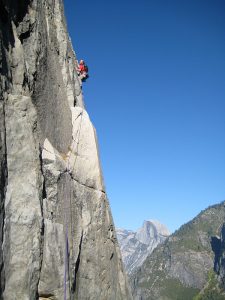Self-Discipline and Commitment: The Great Equalizers

East Buttress of El Cap. Photo courtesy: Eric McCallister.
It takes great discipline to boulder V12, climb 5.14, summit a daunting mountain peak, and do other great things. In fact, regardless of the grade you aspire to climb, it will take great discipline to reach your mega goals and maximize experience. So what exactly is self-discipline and how can you develop greater self-discipline?
Self-discipline is the ability to steadily act with conscious control, in directing or changing behavior, divesting from things of lesser value, and delaying gratification, in the pursuit of a higher purpose or goal. In climbing, it takes self-discipline to train optimally (not overtraining or undertraining), to consume a healthy diet, and to maintain a calm, controlled demeanor while in the midst of a stressful climb. Perhaps most central to self-discipline is abstaining from things (foods, activities, and other extravagant pleasures) that will diminish personal effectiveness and squander time and energy. In all of the above examples, exercising self-discipline requires the assertion of willpower.
As detailed in a previous podcast, willpower is a human endowment that can be highly developed through regular use. So by willing yourself to assert a little more self-discipline each day—by saying no to things that conflict with your goals, and by taking the necessary actions to advance toward those goals—you will not only grow greater self-discipline, but also increase forward momentum, develop more self-confidence, and feel the unique pleasure of total commitment to a goal.
One of the beauties of self-discipline is that it’s a powerful compensatory tool. Think of it as a lever that multiplies your current technical and physical capabilities—and in developing greater self-discipline, you lengthen the lever! Fascinating research at the University of Pennsylvania has shown that self-discipline is a better predictor of academic success than IQ. And while they did not study athletic pursuits, I feel that self-discipline is a similarly strong predictor of athletic success. Thus, although ideal genetics don’t guarantee that you will achieve climbing greatness, lack of self-discipline does guarantee mediocrity. The bottom line: Developing uncommon self-discipline can make up for what you are lacking in resources, experience, or genetic talent. Self-discipline, then, is the great equalizer!
Think of self-discipline as a lever that multiplies your current technical and physical capabilities—and in developing greater self-discipline, you lengthen the lever!
Possessing Healthy Commitment
So what I feel is a healthy level of commitment? Given the energetic and highly focused approach described to training and climbing described on this web site, you might be thinking that Eric’s kind of intense or Eric’s instruction is a little over the top. Yes, I’ve heard this before, but I take it as a compliment—better to be too focused, too analytical, and too disciplined, than to be scatterbrained and lazy. But I digress.
Let me now state clearly that there is such a thing as being overcommitted and going overboard in the pursuit of your goals. While self-discipline, perseverance, and commitment are all necessary to achieve uncommon success and maximum experience, it is healthy and in fact beneficial to occasionally take some time off and break from the ways of strict self-discipline. Taking one day off per week, one weekend off per month, and even a few weeks off per year is essential to refresh your mind, rest your body, and prevent burnout. This is a practice utilized by many of the best climbers, past and present—Caldwell, Sharma, Güllich, Skinner, and many others, take (took) time away from climbing after a long season or upon achieving a major goal. You should, too.
Closing Thoughts
If climbing is really important to you, then you owe it to yourself to assume a healthy level of commitment…that will energize you in the short term and keep you engaged and motivated for years to come. Below I present three markedly different levels of commitment, including what I feel is a healthy level of commitment. Which describes your current commitment level?
- Low commitment is exemplified by the dreamer who takes little meaningful action toward a goal, follows a path of low resistance, and rarely challenges himself. In climbing, low commitment is seen in the person who, despite setting goals, trains haphazardly, climbs infrequently, rarely pushes himself to the point of falling, and fails to persevere in times of adversity.
- Healthy commitment is evident in the passionate person who has a mega goal, a plan of action for achieving it, and a record of taking daily steps toward the goal while maintaining a sense of balance in his/her life. A climber with a healthy level of commitment trains and climbs optimally (rather than obsessively), exercises self-discipline in determining use of time and in avoiding distractions (people, places, and situations), sacrifices things that will conflict with important goals, and balances his/her climbing life with other high-value nonclimbing life activities. Healthy commitment, then, is about having a serious dedication to climbing, but not an obsessive devotion that dismisses all other things in life as unimportant.
- Unhealthy commitment is marked by obsessive thought and pursuit of an activity or goal at the expense of all other things, including one’s physical and mental well-being. Unhealthy commitment to climbing is exemplified by the person who climbs and trains every day or to the point of chronic injury. It is also evident in those who destroy important relationships or sabotage other important life areas in the name of reaching their goals. While climbers with unhealthy commitment may experience significant success for a period of time, they will ultimately end up injured, depressed, and burned out, and hence they are unlikely to reach their big, long-term goals.
Copyright © 2017 Eric J. Hörst | All Rights Reserved.

